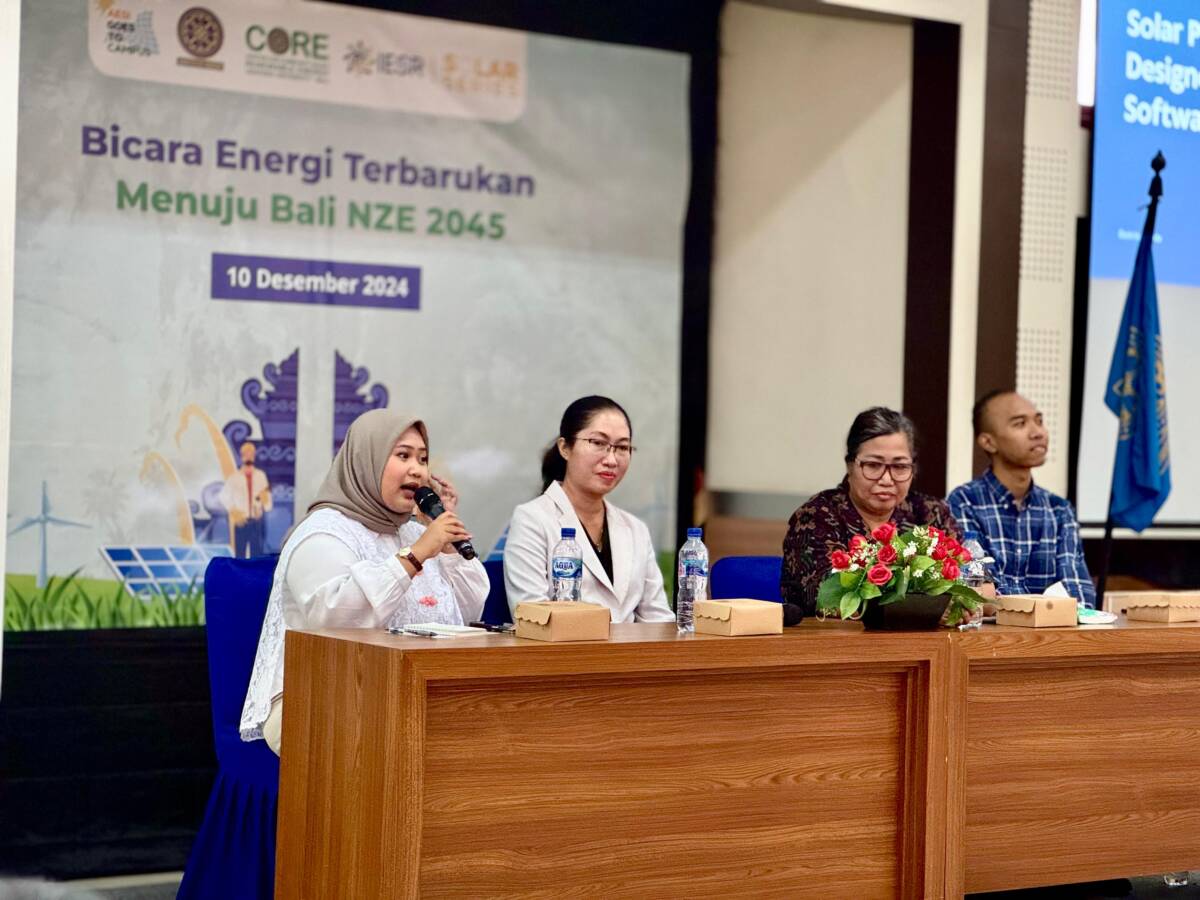Bali, December 10, 2024 – As one of the world’s premier tourist destinations, Bali is currently facing significant challenges associated with the intensifying climate crisis. Threats such as rising sea levels, extreme weather patterns, and increasing pressure on natural resources have underscored the urgent need for a transition to net-zero emissions, a goal outlined in the Bali Net Zero Emission (NZE) 2045 program.
Dean of the Faculty of Engineering at Udayana University, Professor Linawati, emphasized the critical role of students in achieving the Bali NZE 2045 target through collaborative efforts and cross-disciplinary contributions. She highlighted the four academic tracks within the Department of Electrical Engineering at Udayana University—Power Engineering, Telecommunications Engineering, Control Systems, and Computer and Informatics Engineering—as pivotal fields in supporting this ambitious goal. She made these remarks at a workshop organized by the Institute for Essential Services Reform (IESR) in collaboration with the Indonesian Solar Energy Association (AESI) and the Faculty of Engineering, Udayana University.
“To achieve Bali NZE 2045, students can play an active role not only in the generation and power systems sector through renewable energy development but also through advanced fields such as Artificial Intelligence (AI) and Machine Learning. These technologies have significant potential to optimize energy systems, improve electrical efficiency, manage smart grids, and analyze big data for more sustainable energy planning. Cross-disciplinary collaboration will be key to accelerating Bali’s transition towards a low-emission, clean energy economy,” she explained.
Professor Ida Ayu Dwi Giriantari, Chair of CORE Udayana and a Lecturer at the Electrical Engineering Department, Faculty of Engineering, Udayana University, stressed the importance of harnessing Bali’s renewable energy potential to meet the initiative target. She outlined the region’s vast resources, including rooftop solar power (with a potential of 103.3 MWp), floating solar power (574.5 MWp), biomass, and geothermal energy. However, she noted that the current contribution of renewable energy remains below 20 MW—significantly short of the optimal capacity needed.
“Bali has enormous opportunities, but achieving these targets requires well-planned strategies and the implementation of appropriate technologies. For instance, energy storage solutions such as Battery Energy Storage Systems (BESS) and Pumped Hydro Energy Storage (PHES) are critical to support a reliable and efficient clean energy system,” she emphasized.
She further underlined that the development of smart grid infrastructure must be prioritized, as it is key to integrating renewable energy into Bali’s electrical grid. Through strong collaboration between the government, private sector, and community, Bali has the potential to serve as a global model for sustainable energy transition.
Gusti Ayu Kade Widhiastari, a representative of the Bali Rooftop Solar Association (APSA), elaborated on the immense potential of rooftop solar power in Bali, estimated at 26.4 GWp. Widhiastari underscored the role of rooftop solar energy as a primary solution for supporting Bali NZE 2045 goals.
“Rooftop solar is not merely an alternative energy source but a concrete solution to reducing global emissions. With collective commitment, Bali can lead by giving example in implementing renewable energy solutions,” she affirmed.
Meanwhile, I Kadek Alamsta, Founder of Zona EBT and Program Associate at New Energy Nexus Indonesia, highlighted the growing opportunities for green jobs in the renewable energy sector as a key driver in achieving Bali NZE 2045. Alamsta projected that the sector could create hundreds of thousands of jobs by 2030, spanning diverse fields such as technical expertise, energy management, research, and technological innovation.
“Green jobs are not just about employment; they represent a tangible contribution to building a sustainable future. Innovations in solar energy, energy efficiency, and recycling are not merely technical challenges but opportunities for students to develop creative solutions with widespread impact. Students have a vital role not only as job seekers in this sector but also as innovators and entrepreneurs driving meaningful change,” he remarked.
Over 70 participants attended the workshop, including Electrical Engineering students from Udayana University, community organizations (CSOs), and representatives from the Bali Provincial Department of Manpower and Energy and Mineral Resources (ESDM). This event served as a platform to strengthen collaboration among academic institutions, research organizations, and the energy sector in support of Bali’s NZE 2045 objectives.

